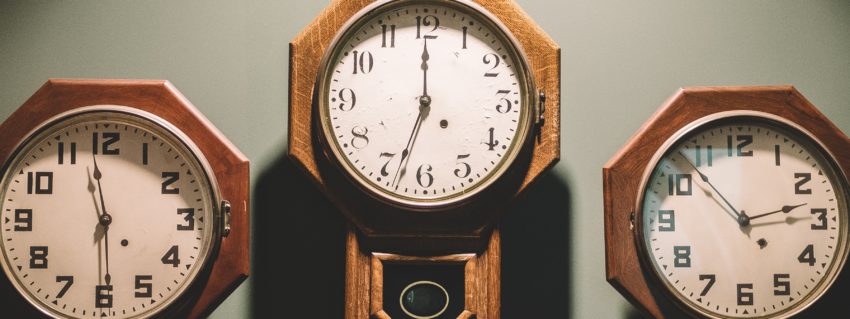Speech 3: Get to the Point. The third speech of the Toastmasters Competent Communicator program is meant to help me set a speech goal and make sure that every element focuses on it.
Picking my topic for this week’s speech was surprisingly difficult. The brief, “Get to the Point,” is right up my alley. I dislike distractions and fluff. Unfortunately recently my life has been nothing but distractions.
It started last week, when my Grandfather clock stopped working. This thing has been in my family for a million years, and even though no one wants it, we keep it around out of some misguided Southern sense of guilt. An ancestor moved from Germany and paid a fortune to ship it to Texas. We used one side as a growth chart, so there are names and dates scratched into it. It bongs every hour from 7am to 10pm, is about eight feet tall, and outweighs me by probably 30 pounds. My great-uncle willed it to me, and every time I visit my grandparents they ask how the clock is doing. My family has a thing about this clock.
I was lying in bed last Friday, trying to think of a Toastmaster topic actually, when my phone alarm went off. I slapped it until it snoozed, but then realized that the clock in the living room hadn’t let out its first bong of the day. I double-checked my phone — 7am on the dot.
I opened the bedroom door and squinted at the clock from across the room. It said 6:55. I grew up with this clock, and it’s never been slow. But it’s probably 100 years old at this point, which I think is a perfectly reasonable age to relax a little. There’s some dials on the side of the clock that let you adjust the time, so I scooted it forward five minutes and was rewarded with seven cheerful bongs. By this point the microwave said 7:05, so I wound the clock forward to match it.
Normally I leave the house a little after 8, which means when I hear eight bongs it’s time to get moving. But somehow it rolled around to 8:15 and the clock hadn’t made a peep. I headed into the living room and lo and behold, the clock was still on 7:05.
By this point I was running late, so I didn’t have time to troubleshoot. I got to work on time, but couldn’t stop thinking about this stupid clock. How was I supposed to find out the problem, much less get it fixed? It’s a hundred year-old mechanical device, not an iPhone. There’s no 1-800-fix-my-grandfather-clock-please.
As the day crept along, I got more and more distracted. Were we keeping the house too cold? Were we supposed to be cleaning it differently? How was I going to tell my grandparents that I broke the family clock?
Thanks to all this anxiety, I didn’t get much work done. I spent a lot of time Googling frantically, hoping to find someone who could save me from being the Clock Killer.
Finally I found someone in Round Rock. I called them a couple times, but the phone rang forever and wouldn’t let me leave a voicemail. I even left work early and went by the shop, hoping I could catch them before they closed.
I missed them by about 10 minutes, but there was a sign on the door that said they’d be open for limited hours the next day, Saturday, for walk-ins only. It’s in this moment that my anxiety got the best of me. Instead of thinking, “Cool, I’ll call tomorrow and see if they can make a house call next week,” I jumped straight to, “I need to borrow a truck and bring this clock to the shop tomorrow afternoon.”
The next day finds me and my friend Sarah undertaking the near-Herculean effort to get this clock into her truck. Fortunately someone attached small wheels to bottom of the clock years ago, so all we really had to worry about was getting it from the ground into the truck bed. We padded everything as best we could, then levered the clock into the truck.
Sarah is even lighter than I am, so it took longer than I thought. By the time we got loaded up, the clock in the truck said we only had about 30 minutes to get to the repair shop. We had to drive slower than normal, and got to the shop with a few minutes to spare.
This is the point when I realized that now we had to get the clock out of the truck. We were trying to lower it to the ground when my grip slipped and the clock landed directly on Sarah’s foot.
Sarah screamed, of course, but I couldn’t get a good hold on the clock to shift it off her foot. A man stuck his head out the shop window and I yelled at him that we needed help. He stared at us for a second and then said, “Why don’t you just use a wristwatch, like everyone else?”
As you may have guessed, this hasn’t been a true story. Instead, it’s an example of my favorite kind of joke: the one that takes almost too long to get to the point — which is then of course a punchline.
I love laughing. And you should too! Not just because it’s fun — it’s actually good for you. It’s one of the first things humans do as newborns. It helps us combat stress and grief, and can improve circulation, lung function, and decrease physical pain. There’s even an International Society for Humor Studies, which is dedicated to the advancement of humor research and its role in business, entertainment, and healthcare.
You’ve probably been sitting here for the last few minutes thinking, “Ugh, Amy, get to the point!” Well here it is. Life can be scary. I encourage you to take time to laugh, either at jokes you hear or the situations in which you find yourself. And remember this quote from Mark Twain: “Humor is mankind’s greatest blessing.” Thank you.
Photo by Andrew Seaman on Unsplash






